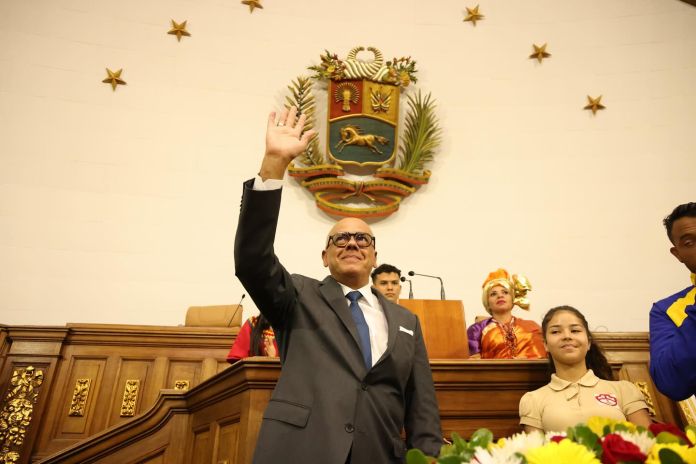MEXICO CITY, Mexico, (venezuelanalysis.com) – Venezuela’s National Assembly president Jorge Rodríguez called last Thursday for the legislative body to set up a special committee to investigate the dispossession of the country’s assets by members of US-backed opposition parties.
“The National Assembly has to remind them that this is a country of laws,” said Rodríguez.
Several Socialist Party (PSUV) deputies brought up the eventual seizure of assets, based on the “Domain Extinction” law approved last year, in order to compensate for the loss of the nation’s patrimony.
In 2019, Washington recognized the self-proclaimed “interim government” as the Caribbean country’s legitimate authority, effectively transferring assets such as Venezuela’s US-based oil refiner CITGO to a group led by Juan Guaidó.
Delaware District Judge Leonard P. Stark determined that state oil company PDVSA was the “alter ego” of the Venezuelan state after the Guaidó-led “administration” bungled its management of the file and failed to disprove that his administration managed funds from CITGO, a PDVSA subsidiary, in a discretionary fashion.
Rodríguez’ request comes following a renewed setback for CITGO after the US Supreme Court refused to consider an appeal meant to keep creditors away from a court-ordered auction of the company’s shares. The “alter ego” rulings made PDVSA, and all its subsidiaries, liable for Venezuela’s state debts, allowing corporations to attach international arbitration awards to the ongoing auction process.
Stark’s ruling leaves Venezuela’s US-based oil refiner CITGO at risk of being broken up and sold after he set the share sale process in motion. A first round of bids is expected later this month.
“In this country there is the Organic Criminal Procedure Code, there is the Domain Extinction Law, a new legal instrument that allows the attorney-general’s office of the Republic to pursue the assets of those who generated this damage against the nation,” said Rodríguez during the parliamentary session.
Although US courts normally protect the shares of a public company owned by a foreign country, viewing the company as legally distinct from the state, Stark specifically pointed to documentation by so-called “interim government” officials in his ruling.
The Delaware judge found that Guaidó and his associates had “drawn directly from PDVSA commercial subsidiaries in the United States” to fund the operations of his so-called “government”.
“These political parties have assets, that is, they are subject to the Domain Extinction Law. It would make me very happy if a political party voted in favour of that, then we would go after those assets,” said Rodríguez.
The parliament chief conceded that even if they did succeed in the seizure of these parties’ assets, it would nonetheless fall far short of the estimated worth of CITGO, believed to be worth US $10-15 billion.
Rodríguez speculated that the money drawn by the now dissolved “interim government” was used to fund lavish lifestyles of self-exiled opposition figures and called for the individuals accused of corruption to be investigated “one by one” and that their parties be held responsible for the consequences of their actions.
The parliament head gave National Assembly vice-president Pedro Infante a one-week deadline to prepare a report on the actions of members of the defunct 2015 National Assembly to perpetuate themselves in office despite their term having expired in January 2021.
Earlier this month, US-backed opposition politicians meeting via Zoom voted to extend the functions of the committee tasked with administering the country’s seized assets for another year. This committee has handled these assets after the expired 2015 parliament voted to dissolve the so-called “interim government”.
Venezuelan deputies also demanded an investigation after the defunct assembly self-approved a $70 million yearly budget, drawn from state assets abroad.
As a result, Rodríguez accused the opposition factions of violating the Barbados Accords, a political agreement reached between the Venezuelan government and the US-backed hardline opposition that sets certain conditions for the upcoming election, due to be held later this year.





